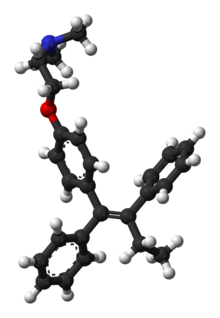 Women taking anti-cancer drug tamoxifen may have their disease come back if they use with it certain antidepressants, according to a new research.
Women taking anti-cancer drug tamoxifen may have their disease come back if they use with it certain antidepressants, according to a new research.
Tumors were more than twice as likely to return after two years in women taking the antidepressants while on the cancer drug, compared with those taking tamoxifen alone, said the study presented Saturday at the American Society of Clinical Oncology meeting in Florida.
About 500,000 women in the United States take tamoxifen, which cuts in half the chances of a breast cancer recurrence. Many of them also take antidepressants for hot flashes, because hormone pills aren’t considered safe after breast cancer.
The research found that using drugs such as Prozac, Paxil or Zoloft can virtually wipe out the benefit tamoxifen provides.
Source:Xinhuanet
Leading mental health charity Mind today (Monday 11 May) publishes the shocking new report Men and mental health: Get it off your chest presenting evidence that the recession is having an adverse affect on men’s mental health . Mind’s You Gov survey found almost 40% of men are worried or low at the moment and the top 3 issues playing on their minds are job security, work and money. A small number of men were even experiencing suicidal thoughts – of these, middle-aged men were much more likely than women to have suicidal thoughts. Middle-aged men currently have the highest suicide rate in England and Wales .
Mind’s Get it off your chest campaign aims to get men to recognise the importance of talking about their problems and is calling for a strategy on men’s mental health, to match the existing women’s mental health strategy. Supporters with personal experience include Lord Melvyn Bragg, Alastair Campbell, Stephen Fry, actor Joe McGann and Heart FM DJ Matt Wilkinson.
Mind’s new YouGov survey of over 2000 men and women found that:
- 31% of men would feel embarrassed about seeking help for mental distress.
- Just 14% of men (35-44yrs) would see a GP if they felt low compared to 37% of women.
- 4% of young men (18-24yrs) would see a counsellor if they felt low compared to 13% of young women.
- Only 31% of men would talk to their family about feeling low compared to nearly half of women.
- Almost twice as many men as women get angry when they are worried.
- 10% of men say they find sex the best way to relax compared to 4% of women.
- Almost twice as many men as women drink alcohol to cope with feeling down.
- Women are nearly 5 times more likely to get tearful than men.
45% of men think they can fight off feeling down compared to 36% of women.
Â
Mind’s Chief Executive Paul Farmer said: “The recession is clearly having a detrimental impact on the nation’s mental health but men in particular are struggling with the emotional impact. Being a breadwinner is something that is still crucial to the male psyche so if a man loses his job he loses a large part of his identity putting his mental wellbeing in jeopardy. The problem is that too many men wrongly believe that admitting mental distress makes them weak and this kind of self stigma can cost lives.”
Source:Mind, Mind is the leading mental health charity in England and Wales. We work to create a better life for everyone with experience of mental distress. www.mind.org.uk
Link Between Seizures and Trauma, Mood Disorders Getting More Attention
When 46-year-old Jane Smith underwent marriage therapy with her husband, the sessions unlocked parts of Jane’s memory that she said she repressed for over a decade — memories with frightening powers.
“I began remembering witnessing my brother being abused… And I began to remember my own abuse,” said Jane, who requested her real name not be used. She said she later realized that she was physically and sexually abused by family members starting at age 4.
Jane confronted her parents, saying she wanted to talk about it, but they did not want to.
“Two weeks later I got a letter from them saying, ‘Don’t contact us again,'” Jane said.
That was when her seizures began. link to continue reading
Source: abc News
Antidepressants can help mild to moderate depression and should not just be used in bad cases, researchers say.
Research published by the National Institute for Health Research Health Technology Assessment (NIHR HTA) programme has found that treatment with a selective serotonin reuptake inhibitor (SSRI) antidepressant alongside supportive care is more effective and cost-effective than supportive care alone for patients with mild to moderate depression. [continue reading…]
 Women taking anti-cancer drug tamoxifen may have their disease come back if they use with it certain antidepressants, according to a new research.
Women taking anti-cancer drug tamoxifen may have their disease come back if they use with it certain antidepressants, according to a new research.